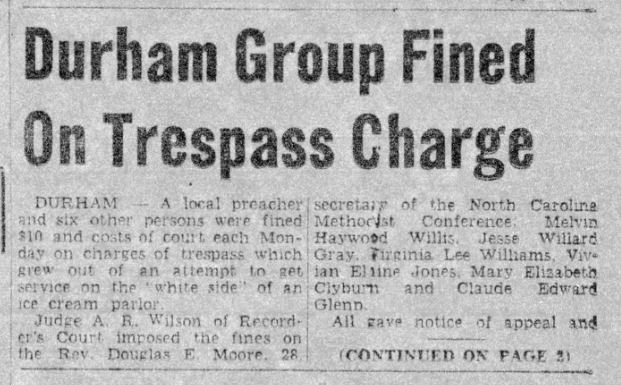Royal Ice Cream Sit-In, Durham, North Carolina
By Kelly Agan, N.C. Government & Heritage Library, 2019
Have you ever heard about the 1957 ice cream shop protest in Durham, North Carolina?

Racial segregation in the United States
Segregation means the forced separation of different racial or ethnic groups. There used to be many laws that required segregation. And they permitted discrimination against black Americans. These laws, sometimes called “Jim Crow” laws, created mandatory separation of races. And they affected all aspects of everyday life. They created inferior spaces and services for black Americans. And they created roadblocks to freedom and opportunity. They affected everything from choice in housing and schools to hospitals and restaurants. Black Americans even had to use different public drinking fountains or bathrooms.
Things heat up at Royal Ice Cream
People in Durham had been struggling to end segregation in the city for more than 20 years. But progress had been slow. Some people felt things needed to speed up. The Rev. Douglas Moore of the Asbury Temple United Methodist Church felt this way. He was a classmate of Dr. Martin Luther King, Jr. at Boston University. He felt that the church had an important role to play in the national civil rights movement.
So, on June 23, 1957, he took a group of young people from a church class out to Royal Ice Cream. They went in through the back door and took seats at the booths. There were seven in the group, known as the “Royal Seven.” The owner asked them to leave. They refused. Then police arrested them for trespassing.
Their case went to trial, and they were each convicted of trespassing by an all-white jury. They appealed their case to the North Carolina Supreme Court. They lost there too. The court upheld state law that allowed segregated facilities for black people. The Royal Seven appealed their case to the U.S. Supreme Court, but the Supreme Court refused to hear the case. In the end, the protesters paid $433.25 in fines for trespassing. They may not have won their case, but they made an important test of the legality of segregated spaces. And their courage in standing up for their rights as human beings spoke for itself.
People in Durham continued to picket and boycott Royal Cream into the early 1960s. The Royal Ice Cream Parlor was finally integrated in March, 1963, allowing blacks to sit and order in the restaurant. Then in 1964 the Civil Rights Act of 1964 made certain types of discrimination illegal. This included discrimination based on race, color, religion, gender and national origin. It also ended legal segregation in schools, employment and public accommodations.
To see images of pickets and boycotts of the Royal Ice Cream Parlor, visit the Durham County Public Library's collection.
References:
Daniels, Dennis. "Royal Ice Cream Sit-In." Research Branch, NC Office of Archives and History, 2007. http://www.ncmarkers.com/Markers.aspx?MarkerId=G-123
"Negroes Fined In Dairy Bar Case," The Durham Morning Herald, June 24, 1957.
Jose Stuntz, "White Jury Selected To Try ‘White Side’ Ice Cream Case," The Durham Morning Herald, July 17, 1957.
Oral History Interview with Conrad Odell Pearson, April 18, 1979. Interview H-0218. Southern Oral History Program Collection (#4007) in the Southern Oral History Program Collection, Southern Historical Collection, Wilson Library, University of North Carolina at Chapel Hill.
Anderson, Jean Bradley (2011). Durham County: a History of Durham County, North Carolina. Durham, NC: Duke University Press.
Davidson, Osha Gray (2007). The Best of Enemies: Race and Redemption in the New South. Chapel Hill, NC: University of North Carolina Press.
Additional Resources:
Video documentary: Southern Foodways Alliance. "Royal Ice Cream Sit-In Documentary." Virtual Martin Luther King, Jr. Project, NC State University. https://vmlk.chass.ncsu.edu/experience/historical/royal-ice-cream-sit-in-documentary/
Image Credits:
"Durham Group Fined on Trespass Charge." The Carolinian (Raleigh, N.C.), June 29, 1957. https://newspapers.digitalnc.org/lccn/sn80008926/1957-06-29/ed-1/seq-1/
2 January 2020 | Agan, Kelly